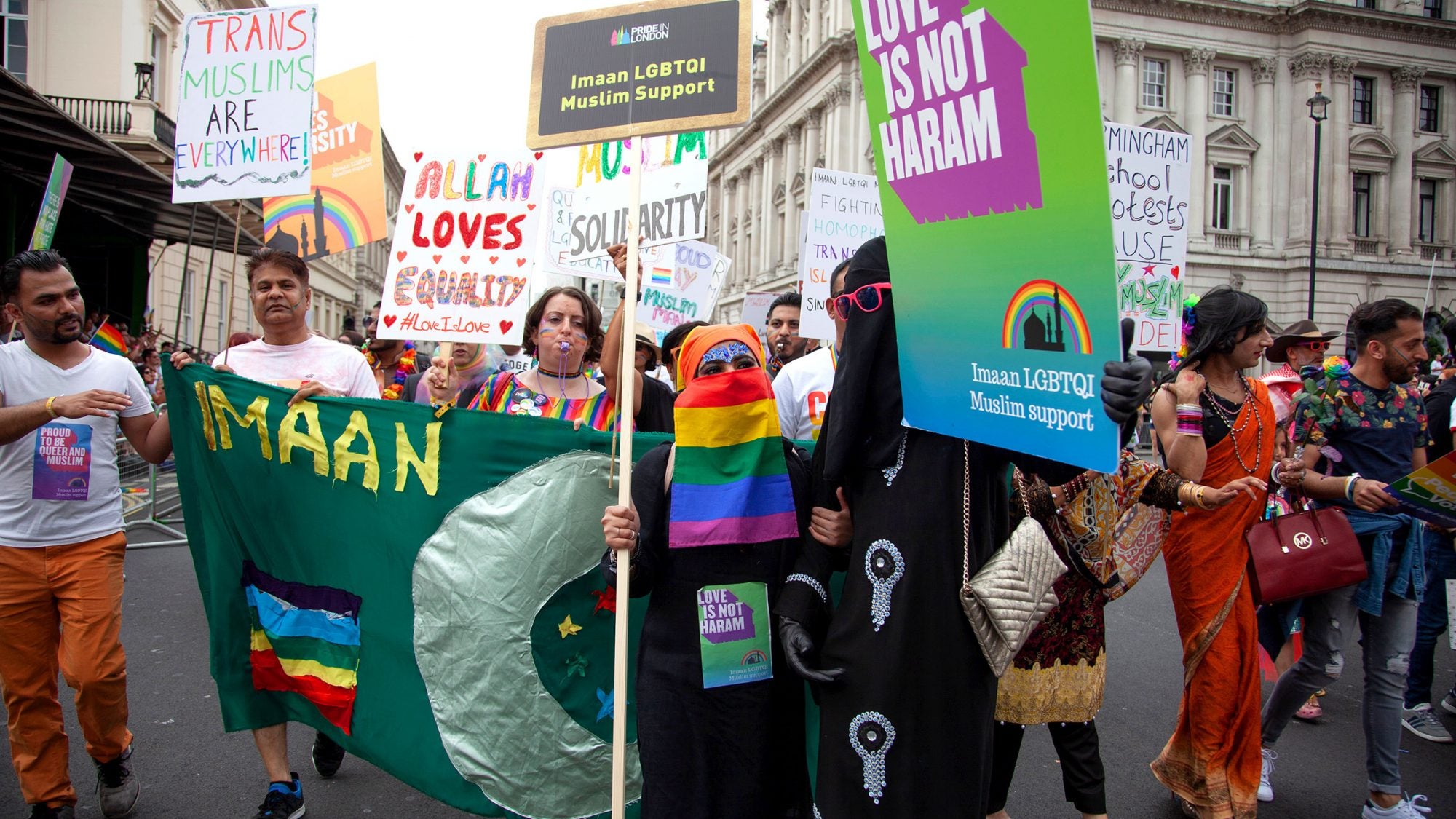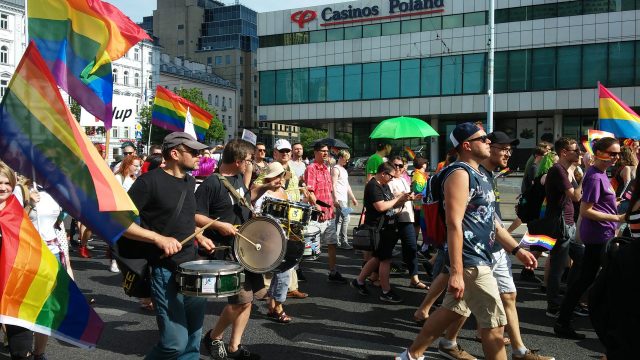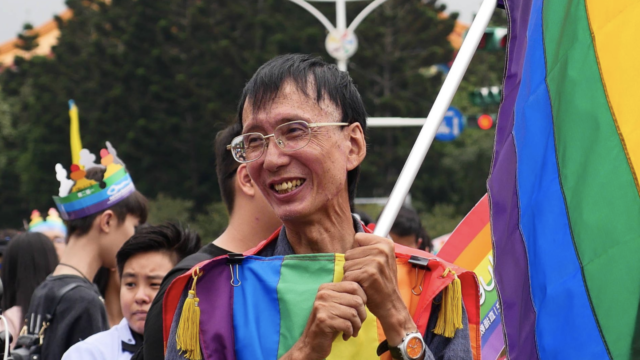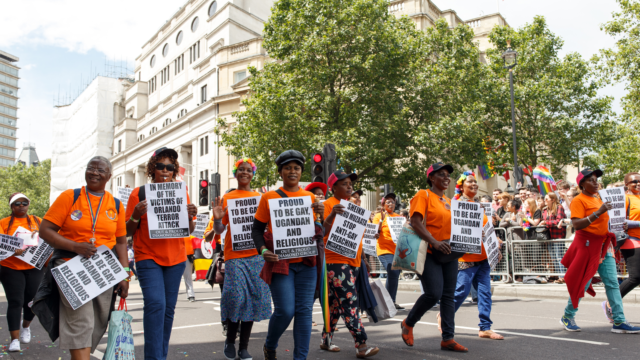
Title: Same-Sex Narratives and LGBTI Activism in the Muslim World
Gay rights in the West have been publicly debated since at least the late 1970s. In much of the rest of the world, however, same-sex relations, and specifically male-to-male intercourse, remain taboo topics and even criminal offenses. The most recent International Lesbian, Gay, Bisexual, Trans and Intersex Association (ILGA) report, released in 2019, states that today seventy countries continue to imprison those found participating in same-sex relations, while others require compulsory medical treatment and conversion therapy.
Same-Sex Narratives and the Sharia
In the Arab-Muslim world, homosexuality is typically perceived as forbidden, or haram. Lesbian, Gay, Bisexual, Transgender, and Intersex (LGBTI) rights are commonly seen as Western notions. In extreme cases, homosexual behavior is subject to corporal punishment or even the death penalty. These harsh punishments are based on Islamic legal theory and the writings of classical seventh century Islamic jurists in relation to sexual intercourse. The latter in fact developed a highly complex and sophisticated jurisprudence (fiqh) that interpreted the Qur’an and Sunna based on various hermeneutical tools. Hence, under Islamic law, zina, or the act of extramarital sexual intercourse between a man and a woman, constitutes a major offense. It is the first of the hadd crimes, which are the six most serious crimes specified in the Qur’an, considered to be crimes against God. The punishment prescribed in the Qur’an for zina is death, subject to fulfilment of the strict legal requirements of proof as stated in the Qur’an.
Sexual relations between men, however, are not specifically mentioned in the Qur’an or Sunna. The term liwat (sodomy) was used by classical jurists in their attempts to interpret the Quranic version of the story of Prophet Lūt’s people. It is in fact narrated in several parts of the Qur’an that the People of Lūt were sinful, committing “immoralities” and “excess” and engaging in “evil deeds.” This is why, according to the Muslim version of the parable, the biblical cities of Sodom and Gomorrah were destroyed. Yet, there has been heated disagreement about the punishment of liwat in both Sunni and Shia jurisprudence. The majority of jurists maintained that it should be equated to zina.
Today, the criminalization of same-sex relations is increasingly questioned. The Sharia aspect of the argument is most heavily debated. Yet personal reasoning (ijtihad) in the context of the Sharia is generally limited and controversial for two reasons: it can only be done by the jurists who are adequately qualified and some Muslim scholars have argued that the process of ijtihad has stopped save for “truly novel cases.” That said, the Sharia law argument in relation to liwat appears to be one of these cases where ijtihad is most contentious. Some authors reiterate the views of the Hanafi school according to which sodomy should not be equated to zina as it does not lead to offspring; others highlight the astonishing acceptance of sexual varieties and gender diversity in the time of the Prophet, extensively documented by the presence of effeminates, or mukhannathūn, within the various circles of the Prophet; while others point to the need to interpret the Lūt parable in its context, condemning immorality and lust rather than sodomy.
Additional punishments for homosexual behavior were transported to the Muslim world through colonial criminal codes. In pre-colonial Muslim societies, a certain degree of tolerance, openness, and, arguably, acceptance of same-sex affection, especially what was often termed “passionate love” between males, existed, as evidenced in particular in love poetry. Colonial laws intervened to suppress what they saw as uncivilized practices and minimize local practices of same-sex intercourse. The best-known example is arguably the so-called “377 offence” (Common Section 377 in the penal codes of the Commonwealth), which is the result of British colonial presence in the Middle East and South Asia. Common Section 377 of the Indian, Bangladeshi, Pakistani, and Nepalese criminal codes punish the crime of carnal intercourse against the order of nature by life imprisonment.
Gay Friendly Mosques vs. ‘Islamization’
This modern Sharia interpretation is naturally a matter of a heated doctrinal debate and remains a non-mainstream approach to LGBTI rights in Islam. However, it has been embraced by LGBTI and human rights activists. Inclusive and gay friendly mosques are mushrooming, and some Imams have come out as gay or otherwise celebrate same-sex unions in countries such as France, Canada, South Africa, Australia, and the United States. Likewise, many Western countries now recognize LGBT-related asylum claims and asylum agencies affirm that anti-gay violence within a country constitutes persecution.
However, LGBTI individuals in Muslim countries are still at risk, as they are in danger of being stripped of their most fundamental rights. In some cases, punishments are extremely harsh. It is reported, that gay people are being hanged in Iran and in beheaded and tortured in Saudi Arabia. This also applies to regions that have been more recently “Islamized,” such as the Aceh region in Indonesia and northern Nigeria. In 2019, Brunei passed a law naming stoning as the appropriate punishment for homosexuality, and only after public outcry did authorities impose a moratorium on the law. Activists and human rights defenders must risk their lives and personal safety even in Muslim-majority countries that are officially secular, as in the case of Turkey, Kyrgyzstan and Uzbekistan.
LGBTI Resilience and the World Cup
This notwithstanding, repression has made pro-LGBTI voices stronger and more resilient. In Muslim South Asia, social activists are putting increasing pressure on their governments, which can lead to more visibility and public acceptance. Additionally, the first gay-trans pride parade was held in Pakistan and there was recognition of a “third sex” in Bangladesh in 2018. In India in particular, the country with the largest Muslim minority worldwide, activism and strategic litigation have started to bear fruit. After a decade of judicial struggle, in Navtej Singh Johar v. Union of India (2018), the Supreme Court of India struck down Section 377, reaffirming the strong pro-equality statements of the Delhi High Court. The judgment was celebrated by Indian communities and hailed by the ILGA as the “most far reaching legal victory of 2018.”
Even the oil-rich Arab Gulf countries seem to be gradually realizing that neither economic development nor meaningful engagement with other states can happen without diversity. While the acceptance of registration of the first gay Kuwaiti association is still up in the air, Gulf countries are increasingly under pressure from the international community to abide by current human rights standards. Clearly Qatar, which is set to host the 2022 FIFA World Cup and has adhered to two major human rights treaties, cannot remain an outsider to these developments—especially given that FIFA has now a detailed human rights policy and is particularly supportive of inclusive football associations such as the International Gay and Lesbian Football Association. Media outlets have reported that Qatari governmental officials have reassured the gay community that “LGBTI fans will be welcome at the World Cup.”
Conclusion
It may appear that Muslim countries face a dilemma as to whether they should recognize LGBT rights or follow Sharia law. This is a false dilemma, as the Qur’an does not specifically prescribe the punishment of sodomy; the role of Muslim scholars and academics in clarifying possible interpretations of the Sharia on this point is crucial. Yet the main issue seems to be intolerant, homophobic attitudes rather than Sharia.
First, those Muslim States that punish same-sex relations with imprisonment should reform their criminal codes and abide by human rights standards, including the prohibition discrimination on the basis of sexual orientation. Second, Muslim States which are in the process of reform and have invested in education and digital transformation, as in the Gulf, should relax regulation on public morality and amend their media laws in order to enhance freedom of speech. Public debate on Sharia-related issues should be free from restraints on culturally sensitive issues such as LGBT rights. Change can only come about through a slow process.
. . .
Eleni Polymenopoulou is Assistant Professor at Hamad Bin Khalifa University, College of Law, in Qatar, where she teaches Advanced Human Rights Law, International Law and Media Law. She is also Visiting Research Fellow at University College London (UCL) – Qatar on a project related to arts, cultural heritage, and religious extremism under Islamic law and international law.
Recommended Articles

Although LGBTQI+ activists in Poland are under attack from the Law and Justice government’s conservative agenda, domestic activists are finding ways to resist and persist. Since the 2015 election of…

On May 24, 2019, Taiwan became the first in Asia to legalize same-sex marriage. In what was widely celebrated as a milestone in the LGBT (lesbian, gay, bisexual, and transgender)…

On October 4, 2019, Ugandan LGBTQ human rights activist Brian Wasswa was found fatally wounded and lying in a pool of his own blood, representing the latest casualty in…